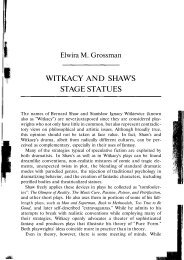COMPARATIVE PERSPECTIVES ON SCOTTISH W RITING
COMPARATIVE PERSPECTIVES ON SCOTTISH W RITING
COMPARATIVE PERSPECTIVES ON SCOTTISH W RITING
Create successful ePaper yourself
Turn your PDF publications into a flip-book with our unique Google optimized e-Paper software.
!"#$%&'<br />
Scott Hames (scott.hames@stir.ac.uk)]<br />
<br />
(( ) * )+<br />
Module Description and Rationale<br />
The ‘new renaissance’ in Scottish literary culture of the 1980-90s was not a journalistic myth.<br />
But how significant, from a literary perspective, is the ‘Scottishness’ of this writing<br />
The approach of this course does not deny the persistence of questions concerning cultural<br />
identity in the works of recent Scottish writers. But it does take seriously Alan Warner’s<br />
complaint that ‘nationalistic canons just set up non-existent barriers to development’. While the<br />
content of the national self-image has been (abundantly, productively) open to revision in Scottish<br />
writing of the past 25 years, the nation’s stable position as the organising principle through which<br />
Scottish writers’ (hugely diverse) bodies of work are read and criticised has seldom been<br />
questioned. In their recent collection of essays Scotland in Theory, Gavin Miller and Eleanor Bell<br />
point to ‘a lingering parochialism in Scottish literary studies, where, for example, literature from<br />
Scotland must firstly be explained in terms of its Scottishness, rather than in terms of its literary<br />
or aesthetic qualities’.<br />
This is the critical misemphasis this course seeks to counteract: the emplacement, without<br />
argument, of the ‘nation’ as the primary category of literary reception. One consequence of this<br />
approach has been Scottish criticism’s deep preoccupation with issues of cultural representation,<br />
often at the expense of other, equally interesting political and philosophical dimensions of recent<br />
Scottish writing. This course attempts to attend to these dimensions, by exploring alternative<br />
intellectual contexts and literary traditions in which to read contemporary Scottish literature.<br />
Our concern, to be sure, is not to disprove the ‘Scottishness’ of the writers at issue, but to explore<br />
their work in stimulating ‘non-Scottish’ contexts. The burden of cultural representativeness, and<br />
the dilemmas of canonical nation-building, will be a critical preoccupation throughout the course.<br />
Set Texts<br />
Irvine Welsh, Trainspotting, Vintage (1993)<br />
Hubert Selby Jr., Last Exit to Brooklyn, Boyars (1964)<br />
A.L. Kennedy, Night Geometry and the Garscadden Trains, Vintage (1990)<br />
Katherine Mansfield, Selected Stories, Oxford World’s Classics (2002)<br />
James Kelman, The Busconductor Hines, Polygon (1984)<br />
Knut Hamsun, Hunger (trans. by Sverre Lyngstad), Canongate (1890)<br />
Albert Camus, The Outsider (trans. by Joseph Laredo), Penguin (1942)<br />
Alan Warner, Morvern Callar, Vintage (1996)<br />
A Module Reader will also be available for purchase, with selected poetry (including work by Kathleen<br />
Jamie, Edwin Morgan and Don Paterson) and essential secondary material, including author interviews.<br />
Assessment<br />
Two essays of 2500 words, weighted equally.
Seminar Timetable<br />
2-hour seminars will take place on X from Y to Z.<br />
NB detailed listings of set and recommended reading, and weekly seminar tasks, are included in the Module Reader.<br />
[See below for readings and bibliographies.]<br />
The timetable below is only an outline guide, and does not list all weekly reading.<br />
19 Feb Introductory: ‘The New Renaissance’<br />
Heteroglossia and the City<br />
26 Feb Trainspotting<br />
Film Screening: Trainspotting (Danny Boyle, 1996)<br />
4 Mar Last Exit to Brooklyn<br />
Film Screening: Last Exit to Brooklyn (Uli Edel, 1989)<br />
Secret and Public Selves<br />
11 Mar Night Geometry and the Garscadden Trains<br />
18 Mar Mansfield, Selected Stories<br />
25 Mar Internationalism in Modern Scottish Poetry<br />
Essay 1 due Friday 28 March<br />
Subjective Adventures<br />
8 Apr Hunger<br />
15 Apr The Busconductor Hines<br />
Existential Voices<br />
22 Apr The Outsider<br />
29 Apr Morvern Callar<br />
Film Screening: Morvern Callar (Lynne Ramsay, 2002)<br />
Essay 2 due Friday 9 May<br />
2
Weekly Readings and Tasks<br />
Each weekly listing of set and recommended reading also includes a number of questions to be considered<br />
in advance of that week’s seminar. These questions will guide class discussion, and it is essential that you<br />
give them some thought in advance of class. All set secondary reading is included in the Module Reader.<br />
Week 1: Introductory: ‘The New Renaissance’<br />
19 Feb<br />
Set Reading:<br />
Duncan, Ian 2003. ‘On the Study of Scottish Literature’, ScotLit, 28, Glasgow: Association for Scottish<br />
Literary Studies<br />
Sassi, Carla 2005. ‘Approaches and Intersections: A View from Without’ in Why Scottish Literature<br />
Matters, Edinburgh: Saltire Society, 1-18<br />
Schoene, Berthold 2007. ‘Going Cosmopolitan: Reconstituting Scottishness in Post-Devolution Criticism’<br />
in Edinburgh Companion to Contemporary Scottish Literature, ed. by Berthold Schoene, Edinburgh:<br />
Edinburgh University Press, 7-17<br />
Whyte, Christopher 2004. ‘Scottishness and Scottish Poetry’ in Modern Scottish Poetry, Edinburgh:<br />
Edinburgh University Press, 5-17<br />
Tasks:<br />
1. Generally, is the nationality of a writer an important consideration when studying his/her work<br />
Why or why not<br />
2. What are your own initial impressions of the ‘Scottishness’ of Scottish literature Does it matter Does<br />
the category ‘Scottish literature’ disappear if we ‘set aside’ Scottishness<br />
3. How appropriate are ‘postcolonial’ critical approaches to Scottish literature, in your opinion<br />
4. Chrisopher Whyte draws our attention to ‘Proust’s paradox’, concerning the necessity of both<br />
nationalizing and denationalizing literary works. Which is more necessary, in your view, and does it<br />
depend on the nation in question<br />
Recommended Further Reading – for the Module Overall:<br />
Bell, Eleanor and Miller, Gavin, eds. 2003. Scotland in Theory: Reflections on Culture and Literature,<br />
Amsterdam: Rodopi<br />
Bell, Eleanor 2004. Questioning Scotland: Literature, Nationalism, Postmodernism, Basingstoke: Palgrave<br />
Macmillan*<br />
Carruthers, Gerard, et al, eds. 2004. Beyond Scotland: New Contexts for Twentieth-Century Scottish<br />
Literature, Amsterdam: Rodopi<br />
Craig, Cairns 1999. The Modern Scottish Novel: Narrative and the National Imagination, Edinburgh:<br />
Edinburgh University Press*<br />
Craig, Cairns 2007. ‘The Criticism of Scottish Literature: Tradition, Decline and Renovation’ in Edinburgh<br />
History of Scottish Literature, Vol. 3, ed. by Ian Brown et al, Edinburgh: Edinburgh University<br />
Press, 42-53*<br />
Crawford, Robert 1997. ‘Dedefining Scotland’ in Studying British Cultures, ed. by Susan Bassnett,<br />
London: Routledge, 87-101<br />
3
Crawford, Robert 2000. Devolving English Literature, 2nd edn., Edinburgh: Edinburgh University Press*<br />
Fazzini, Marco ed. 2005. Alba Literaria: A History of Scottish Literature, Venezia Mestre: Amos<br />
Gardiner, Michael 2006. From Trocchi to Trainspotting: Scottish Critical Theory Since 1960, Edinburgh:<br />
Edinburgh University Press*<br />
Gifford, Douglas 1990. ‘At Last – the Real Scottish Literary Renaissance’ and ‘Killing the Dreams of<br />
Tradition and Modernity’, Books in Scotland, 34<br />
Kravitz, Peter, ed. 1997. Picador Book of Contemporary Scottish Fiction, London: Picador*<br />
McCulloch, Margery Palmer 1994. ‘What crisis in Scottish fiction Creative courage and cultural<br />
continuity in novels by Friel, Jenkins and Kelman’, Cencrastus, 48, 15-18<br />
McIlvanney, Liam 2002. ‘The Politics of Narrative in the Post-war Scottish Novel’ in On Modern British<br />
Fiction, ed. by Zachary Leader, Oxford: Oxford University Press, 181-208<br />
March, Cristie L. 2002. Rewriting Scotland: Welsh, McLean, Warner, Banks, Galloway and Kennedy,<br />
Manchester: Manchester University Press*<br />
Sassi, Carla 2005. Why Scottish Literature Matters, Edinburgh: Saltire Society<br />
Schoene, Berthold ed. 2007. Edinburgh Companion to Contemporary Scottish Literature, Edinburgh:<br />
Edinburgh University Press [on order]*<br />
Talib, Ismail S. 2002. The Language of Postcolonial Literatures: An Introduction, London: Routledge*<br />
Wallace, Gavin and Stevenson, Randall Stevenson, eds., 1993. The Scottish Novel Since the Seventies: New<br />
Visions, Old Dreams, Edinburgh: Edinburgh University Press*<br />
Watson, Roderick 2006. The Literature of Scotland, 2nd edn., 2 vols., Basingstoke: Palgrave Macmillan<br />
Whyte, Christopher 2004. Modern Scottish Poetry, Edinburgh: Edinburgh University Press<br />
International Journal of Scottish Literature, ed. by Eleanor Bell and Scott Hames, www.ijsl.stir.ac.uk<br />
Weeks 2-3: Heteroglossia and the City<br />
26 Feb<br />
Set Reading:<br />
Welsh, Irvine 1993. Trainspotting, London: Vintage<br />
Vice, Sue 1997. From ‘Heteroglossia: “I hear voices everywhere…”’ in Introducing Bakhtin, Manchester:<br />
Manchester University Press, 18-28<br />
Crowley, Tony 2003. ‘Introduction: Language, Knowledge, Power’ in Standard English and the Politics of<br />
Language, 2nd edn., Basingstoke: Palgrave Macmillan, 1-11<br />
Notes on the City – Extracts from Engels, Williams, Bauman and Mumford<br />
Interviews:<br />
Berman, Jenifer 1996. ‘An interview with Irvine Welsh’ Bomb, 56<br />
Kelly, Aaron 2004. ‘In Conversation with Irvine Welsh’, Edinburgh Review, 113, 7-18<br />
Film Screening:<br />
Trainspotting, dir. by Danny Boyle (1996) – Feb 25, 4.30 pm, Pathfoot B2<br />
Tasks<br />
1. Margaret Thatcher famously claimed that ‘there is no such thing as society … there are individual men<br />
and women, and there are families’. Does Trainspotting prove her point, or argue against it<br />
2. For Bakhtin, the ideology of ‘monologic’ language aspires to ‘the victory of one reigning language<br />
(dialect) over the others, the supplanting of languages, their enslavement, the process of illuminating them<br />
with the “True Word”, the incorporation of barbarians and lower social strata into a unitary language of<br />
culture and truth, the canonization of ideological systems’.<br />
4
How do you see Trainspotting in relation to this process, and this ideology<br />
3. What kinds of ‘knowable communities’ are in this book Are they specifically Scottish British<br />
‘Western’ Consumerist Something else<br />
4 Mar<br />
Set Reading:<br />
Selby, Hubert, Jr., 1968. Last Exit to Brooklyn, London: Boyars<br />
Demotic Language and Narration: short extracts from William McIlvanney, Docherty (1975) and Lewis<br />
Grassic Gibbon, Sunset Song (1932)<br />
Interview:<br />
O’Brien, John 1981. ‘An Interview with Hubert Selby’, Review of Contemporary Literature [full interview<br />
at http://dalkeyarchive.com/interviews/620/hubert-selby-2]<br />
Film Screening:<br />
Last Exit to Brooklyn, dir. by Uli Edel, (1989) – Mar 3, 4.30pm, Pathfoot B2<br />
Tasks<br />
1. In 1831 Thomas Carlyle wrote of the London populace: ‘There in their little cells, divided by partitions<br />
of brick or board, they sit strangers … It is a huge aggregate of little systems, each of which is again a small<br />
anarchy, the members of which do not work together, but scramble against each other.’ Is this a fair<br />
description of the urban world depicted in Last Exit<br />
2. Does the novel encourage us to judge, and even condemn, these characters If so, how By what/whose<br />
standards<br />
3. How does using a non-standard language as the voice of the authorial narrative (as in the Grassic<br />
Gibbon extract) differ from reserving it for characters’ dialogue (as in the McIlvanney extract) How does<br />
Selby’s technique compare to these examples<br />
4. Compare the use of vernacular language in Last Exit with Welsh’s techniques in Trainspotting. What<br />
similarities do you see What differences What is the overall effect<br />
Recommended Further Reading – Weeks 2-3:<br />
Bell, Ian 1993. ‘Last exit to Leith’, Observer (15 August 1993), 47 [use Lexis-Nexis, via elec. resources<br />
page]<br />
Crowley, Tony 2003. Standard English and the Politics of Language, 2nd edn., Basingstoke: Palgrave<br />
Macmillan*<br />
Findlay, Elspeth 2002. ‘The bourgeois values of Irvine Welsh’, Cencrastus, 71, 5-6<br />
Freeman, Alan 1996. ‘Ghosts in Sunny Leith: Irvine Welsh’s Trainspotting’, in Studies in Scottish Fiction:<br />
1945 to Present, ed. by Suzanne Hagemasdnn, Frankfurt: Peter Lang, 251-62<br />
Innes, Kirstin 2007. ‘Renton’s Bairns: Identity and Language in the post-Trainspotting novel’ in Edinburgh<br />
Companion to Contemporary Scottish Literature, ed. by Berthold Schoene, Edinburgh: Edinburgh<br />
University Press, 301-310*<br />
Jamieson, Gill 1997. ‘Fixing the city: arterial and other spaces in Irvine Welsh’s fiction’, in Space and<br />
Place: the Geographies of Literature, ed. by Glenda No rquay and Gerry Smyth, Liverpool: John<br />
Moores University Press, 217-26<br />
Kelly, Aaron 2005. Irvine Welsh, Manchester: Manchester University Press*<br />
5
Maley, Willy 2000. ‘Denizens, citizens, tourists, and others: marginality and mobility in the writings of<br />
James Kelman and Irvine Welsh’ in City Visions, ed. by David Bell and Azzedine Haddour, Harlow:<br />
Longman, 60-72<br />
Milne, Drew 2003. ‘The Fiction of James Kelman and Irvine Welsh’ in Contemporary British Fiction, ed.<br />
by Richard J. Lane, Rod Mengham and Philip Tew, London: Polity, 158-174<br />
Morace, Robert 2006. ‘Irvine Welsh: Parochialism, Pornography and Globalisation’ in Edinburgh<br />
Companion to Contemporary Scottish Literature, ed. by Berthold Schoene, Edinburgh: Edinburgh<br />
University Press, 27-236*<br />
Morris, Pam, ed. 1994. The Bakhtin Reader: Selected Writings of Bakhtin, Medvedev, and Voloshinov,<br />
London: Arnold<br />
Renfrew, Alastair 1997. ‘Them and Us Representation of Speech in Contemporary Scottish Fiction’, in<br />
Exploiting Bakhtin, ed. by Alastair Renfrew, Glasgow: Strathclyde Modern Language Studies,15-<br />
28*<br />
Renfrew, Alastair 2006. ‘Brief Encounters, Long Farewells: Bakhtin and Scottish Literature’, International<br />
Journal of Scottish Literature, 1 [www.ijsl.stir.ac.uk]<br />
Squires, Claire 1999. ‘Trainspotting and Publishing, or Converting the Smack into Hard Cash’, Edinburgh<br />
Review, 101, 50-56<br />
Strachan, Zoe 2004. ‘Queerspotting’, Spike [www.spikemagazine.com/0599queerspotting.php]<br />
Vice, Sue 1997. Introducing Bakhtin, Manchester: Manchester University Press*<br />
Watson, Roderick 1995. ‘Alien Voices from the Street: Demotic Modernism in Modern Scots Writing’ in<br />
The Yearbook of English Studies, ed. by Andrew Gurr, London: Maney & Sons, 141-155<br />
Watson, Roderick 1997. ‘Speaking in Tongues: Reflections after Bakhtin on the Scots Literary Tradition<br />
and Contemporary Writing’, in Exploiting Bakhtin, ed. by Alastair Renfrew, Glasgow: Strathclyde<br />
Modern Language Studies, 1-14<br />
Weeks 4-5: Secret and Public Selves<br />
11 Mar<br />
Set Reading:<br />
Kennedy, A.L. 1990. Night Geometry and the Garscadden Trains, London: Vintage<br />
Interview:<br />
March, Cristie L. 1999. ‘Interview with A.L. Kennedy’, Edinburgh Review, 101, 99-119<br />
Tasks:<br />
1. ‘And there’s no point in being Scottish if you can’t make up your past as you go along.’ Is cultural<br />
memory a preoccupation of these stories As opposed to (or in tension with) personal memory<br />
2. ‘Why should I write about people when most of the people can never be written about because they have<br />
completely disappeared Not a National Insurance number, not hairs caught in a comb. They’re gone.’<br />
Kennedy’s work seems constantly aware of the fragility of meaning. How do her stories answer the<br />
question she poses above<br />
3. Public transport plays a small, suggestive role in many of these stories. What might it symbolise Think<br />
of specific examples.<br />
4. What brings people together in these stories What separates them<br />
18 Mar<br />
Set Reading:<br />
6
Mansfield, Katherine 2002. Selected Stories, ed. by Angela Smith, Oxford: Oxford University Press<br />
[Stories to be discussed: ‘Something Childish but Very Natural’, ‘An Indiscreet Journey’, ‘Prelude’, ‘A Dill<br />
Pickle’, ‘Je ne parle pas français’, ‘Bliss’, ‘The Man Without a Temperament’, ‘At the Bay’, ‘A Married<br />
Man’s Story’, ‘The Garden Party’, ‘The Doll’s House’, ‘The Fly’]<br />
Tasks:<br />
1. Mansfield is sometimes accused of authorial cruelty. Is this your impression<br />
2. ‘Scene’ seems as important as ‘action’ in many of these stories – do you agree What is the significance<br />
of place in Mansfield<br />
3. How would you describe Mansfield’s treatment of social class How does it compare with Kennedy’s<br />
How do the two writers approach sexual relationships (recognising the historical distance between them)<br />
4. If Kennedy narrative voice is remote and precise, always in control of the story (however mysterious),<br />
how would you compare Mansfield’s narrative style What are its strengths<br />
Recommended Further Reading – Weeks 4-5:<br />
Bell, Eleanor 1999. ‘Scotland and Ethics in the Work of A.L. Kennedy’, Scotlands, 5.1, 105-113<br />
Borthwick, David 2006 ‘A.L. Kennedy’s Dysphoric Fictions’ in Edinburgh Companion to Contemporary<br />
Scottish Literature, ed. by Berthold Schoene, Edinburgh: Edinburgh University Press, 264-275*<br />
Dunbar, Pamela 1997. Radical Mansfield: Double Discourse in Katherine Mansfield’s Short Stories,<br />
Basingstoke: Macmillan*<br />
March, Cristie L. 2002. ‘A.L. Kennedy’s Introspections’ in Rewriting Scotland, Manchester: Manchester<br />
University Press, 134-161*<br />
Michel, Paulette and Dupuis, Michel, eds. 1989. The Fine Instrument: Essays on Katherine Mansfield,<br />
Coventry: Dangaroo Press<br />
Palditch, Jan 1996. The Critical Response to Katherine Mansfield, London: Greenwood Press*<br />
Smith, Angela 2000. Katherine Mansfield: A Literary Life, Basingstoke: Palgrave Macmillan*<br />
Tew, Philip 2003. ‘The Fiction of A.L. Kennedy’ in Contemporary British Fiction, ed. by Richard J. Lane,<br />
Rod Mengham and Philip Tew, London: Polity, 120-141*[on order]<br />
Week 6: Internationalism in Contemporary Scottish Poetry<br />
25 Mar<br />
Set Reading:<br />
Hugh MacDiarmid<br />
‘I Am with the New Writers’ (1943), ‘Glasgow, 1960’ (1935)<br />
Tom Leonard<br />
from Situations Theoretical and Contemporary (1986)<br />
Edwin Morgan<br />
‘The Flowers of Scotland’ (1969)<br />
‘Aberdeen Train’ (1968)<br />
Glasgow Sonnets (1972)<br />
7
from Sovpoems (1961) [translations]<br />
Introduction, ‘Sevastopol 1905’, ‘To a Friend’, ‘Spring’ (Pasternak); ‘O tears in the world’s eyes!’<br />
(Tsvetayeva); ‘Ay, but can ye’,‘Whit mair’ (Mayakovsky)<br />
Kathleen Jamie<br />
from The Queen of Sheba (1994)<br />
‘The Queen of Sheba’, ‘Mr and Mrs Scotland are Dead’<br />
from Jizzen (1999)<br />
‘The Graduates’, ‘Forget It’, ‘Rhododendrons’<br />
from The Tree House (2004)<br />
‘For When the Grape-vine’s Sap’, ‘Hame’ (after Rilke)<br />
Don Paterson<br />
from Nil Nil (1993)<br />
‘Morning Prayer’, ‘An Elliptical Stylus’, ‘The Alexandrian Library’, ‘Nil Nil’<br />
from God’s Gift to Women (1997)<br />
‘A Private Bottling’<br />
from Landing Light (2003)<br />
‘The Rat’, ‘Form’, ‘Twinflooer’<br />
‘Palm’, ‘Archaic Torso of Apollo’ (after Rilke)<br />
from The Eyes: Versions after Antonio Machado (1999)<br />
‘Dream’, ‘The Eyes’, ‘Three Lyrics’, ‘Marginal Notes’, ‘Meditation’,<br />
‘from New Songs’, Afterword<br />
Tasks:<br />
1. Are these poems Scottish, or do they just happen to have been made by Scottish people Does it matter<br />
2. How do Scottish language-forms (including Gaelic, Scots, and the representation of Scottish accents)<br />
‘locate’ these poems culturally Does it make them seem ‘parochial’ How about the translations into<br />
Scots<br />
3. What relationship between the local and the global – the particular and the international, as MacDiarmid<br />
has it in ‘I Am with the New Writers’ – do these poems suggest to you<br />
4. Is it contradictory to honour Edwin Morgan – a great polyglot, modernist internationalist – with the<br />
rather old-fashioned sounding title of Scots Makar<br />
Recommended Further Reading – Week 6:<br />
Criticism<br />
Bell, Eleanor 2007. ‘Old Country, New Dreams: Scottish Poetry since the 1970s’ in Edinburgh History of<br />
Scottish Literature, Vol. 3, ed. by Ian Brown et al, Edinburgh: Edinburgh University Press, 185-98*<br />
Crawford, Robert 1993. Identifying Poets: Self and Territory in Twentieth-Century Poetry, Edinburgh:<br />
Edinburgh University Press<br />
Gairn, Louisa 2006. ‘Kathleen Jamie and Ecology’ in Edinburgh Companion to Contemporary Scottish<br />
Literature, ed. by Berthold Schoene, Edinburgh: Edinburgh University Press, 236-45*<br />
Hames, Scott 2006. ‘Don Paterson and Poetic Autonomy’, in The Edinburgh Companion to Contemporary<br />
Scottish Literature, ed. by Berthold Schoene, Edinburgh: Edinburgh University Press, 245-55*<br />
8
Hubbard, Tom 2006. ‘Doing Something Uncustomary: Edwin Morgan and Attila József’, International<br />
Journal of Scottish Literature, 1 [www.ijsl.stir.ac.uk]<br />
Morgan, Edwin 1990. Nothing Not Giving Messages: Reflections on Work and Life, ed. by Hamish Whyte,<br />
Edinburgh: Polygon*<br />
Nicholson, Colin 2002. Edwin Morgan: Inventions of Modernity, Edinburgh: Edinburgh University Press*<br />
Purves, Robin 1999. ‘Celtic Twiglet: Against Robert Crawford’s Scotland’, Angel Exhaust, 16<br />
[available online at http://www.poetrymagazines.org.uk/magazine/record.aspid=13918]<br />
Watson, Roderick 1987. ‘Internationalising Scottish Poetry’, in History of Scotish Literature: Vol. 4,<br />
Twentieth Century, ed. by Cairns Craig, Aberdeen: Aberdeen University Press, 311-331*<br />
Whyte, Christopher 2004. Modern Scottish Poetry, Edinburgh: Edinburgh University Press*<br />
Whyte, Christopher 2006. ‘Twenty-one Collections for the Twenty-First Century’ in The Edinburgh<br />
Companion to Contemporary Scottish Literature, ed. by Berthold Schoene, Edinburgh: Edinburgh<br />
University Press, 78-88*<br />
Poetry<br />
Jamie, Kathleen 1994. The Queen of Sheba, Newcastle: Bloodaxe<br />
Jamie, Kathleen 1999. Jizzen, London: Picador<br />
Jamie, Kathleen 2004. The Tree House, London: Picador<br />
Morgan, Edwin 1990. Collected Poems, Manchester: Carcanet<br />
Morgan, Edwin 1996. Collected Translations, Manchester: Carcanet<br />
O’Rourke, Daniel 2002. Dream State: New Scottish Poets, 2nd edn., Edinburgh: Polygon [on order]<br />
Paterson, Don 1999. The Eyes: Versions of Antonio Machado, London: Faber<br />
Paterson, Don 2003. Landing Light, London: Faber<br />
Paterson, Don 2006. Orpheus, London: Faber [on order]<br />
Watson, Roderick ed. 1995. The Poetry of Scotland, Edinburgh: Edinburgh University Press<br />
Scots Dictionary<br />
Dictionary of the Scots Language Online [http://www.dsl.ac.uk/]<br />
Weeks 7-8: Subjective Adventures<br />
8 Apr<br />
Set Reading:<br />
Hamsun, Knut 2006. Hunger, trans. by Sverre Lyngstad, Edinburgh: Canongate<br />
Wood, James 2004. ‘Knut Hamsun’s Irresponsible Selves’ in The Irresponsible Self: On Laughter and the<br />
Novel, London: Jonathan Cape, 96-112<br />
9
Kelman, James 2007. ‘Not not while the giro’ in Not note while the giro, Edinburgh: Polygon, 197-225<br />
Tasks:<br />
1. How do you relate to Hamsun’s rather unpredictable protagonist Do you want him to cease suffering<br />
2. What is the significance of the hero’s elaborate fantasy life Does James Wood have any answers here<br />
3. Does the conclusion of the novel strike you as a hopeful one<br />
4. What links can you see between Hamsun’s novel and the Kelman story<br />
15 Apr<br />
Set Reading:<br />
Kelman, James 2007. The Busconductor Hines, Edinburgh: Polygon<br />
Kelman, James 1995. ‘The same is here again’ and ‘Where I was’ from Lean Tales, London: Vintage<br />
Interviews:<br />
McLean, Duncan 1985. ‘James Kelman Interviewed’, Edinburgh Review, 71, 64-80<br />
McNeill, Kirsty 1989. ‘Interview with James Kelman’, Chapman, 57, 1-9<br />
Tasks:<br />
1. This is probably the most influential novel written in Scotland since the 1960s. Why should this be<br />
(Have another look at the Kelman interviews, for a sense of context.)<br />
2. How would you characterize the portrayal of Hines’ inner life What is Kelman’s technique for showing<br />
us this subjective world, and what are its effects Can you see any similarities / contrasts with Hamsun<br />
3. If Hunger is ‘the classic novel of humiliation’ (George Steiner), what is Kelman’s novel Classic or<br />
otherwise, what are the emotional realities the book most intensely evokes<br />
4. What do you make of Hines’ decision at the novel’s climax How do you read it in the light of<br />
Kelman’s socialism<br />
5. On the evidence of this week’s reading, is Kelman more effective at novel length, or in a short-story<br />
Recommended Further Reading – Weeks 7-8:<br />
Craig, Cairns 1993. ‘Resisting Arrest: James Kelman’ in The Scottish Novel Since the Seventies, ed. by<br />
Gavin Wallace and Randall Stevenson, Edinburgh: Edinburgh University Press, 99-114<br />
Gardiner, Michael 2004. ‘James Kelman Interviewed’, Scottish Studies Review, 5.1, 101-15<br />
Hames, Scott 2007. ‘Dogged Masculinities: Male Subjectivity and Socialist Despair in Kelman and<br />
McIlvanney’, Scottish Studies Review 8.1, 67-87<br />
Jackson, Ellen-Raïssa Maley, Willy, eds. 2001. Kelman and Commitment, Edinburgh Review, 108 [special<br />
issue on Kelman]*<br />
Kelman, James 1992. Some Recent Attacks: Essays Cultural and Political, Stirling: AK Press<br />
Kelman, James 2002. “AND THE JUDGES SAID…”: Essays, London: Secker & Warburg*<br />
Klaus, H. Gustav 2004. James Kelman, Tavistock, Devon: Northcote House*<br />
Klaus, H. Gustav 1994. ‘Kelman for Beginners’, Journal of the Short Story in English, 22, 127-135<br />
10
Kovesi, Simon 2007. James Kelman, Manchester: Manchester University Press*<br />
Maley, Willy 2000. ‘Denizens, citizens, tourists, and others: marginality and mobility in the writings of<br />
James Kelman and Irvine Welsh’ in City Visions, ed. by David Bell and Azzedine Haddour, Harlow:<br />
Longman, 60-72<br />
Maley, Willy 1996. ‘Swearing Blind: Kelman and the Curse of the Working Classes’, Edinburgh Review,<br />
95, 105-112<br />
Milne, Drew 1992. ‘James Kelman: dialects of urbanity’, in Writing Region and Nation, ed. by James A.<br />
Davies and Glyn Pursglove, Swansea Review, 1994 (Conference proceedings, Fourth International<br />
Conference on the Literature of Region and Nation, Swansea, 1992), 393-407<br />
Milne Drew 2003. ‘The Fiction of James Kelman and Irvine Welsh’ in Contemporary British Fiction, ed.<br />
by Richard J. Lane, Rod Mengham and Philip Tew, London: Polity, 158-174<br />
Nicoll, Laurence 2000. ‘‘This is not a nationalist position’: James Kelman’s existential voice’, Edinburgh<br />
Review, 103, 79-85<br />
Watson, Roderick 1995. ‘Alien Voices from the Street: Demotic Modernism in Modern Scots Writing’ in<br />
The Yearbook of English Studies, 25, 141-155<br />
Wood, James 1994. ‘In Defence of Kelman’, The Guardian, 25 October 1994, T9<br />
Weeks 9-10: Existential Voices<br />
22 Apr<br />
Set Reading:<br />
Camus, Albert 2000. The Outsider, trans by Joseph Laredo, London: Penguin<br />
Extracts from Camus, The Rebel and The Myth of Sisiphus<br />
Tasks:<br />
1. What does the term ‘existentialism’ mean or suggest to you<br />
2. ‘That hopeless encounter between human questioning and the silence of the universe’ (Camus). Is this a<br />
fair summary of Meursault’s predicament<br />
3. How is the oddness of Meursault’s state of mind established Find specific examples.<br />
4. ‘They were looking at us in silence, but in their own special way, as if we were nothing more than blocks<br />
of stone or dead trees.’ How does The Outsider treat perception as morally charged<br />
5. Is this novel about a philosophy, or about a person Either way, are there any heroes in it<br />
29 Apr<br />
Set Reading:<br />
Warner, Alan 1996. Morvern Callar, London: Vintage<br />
Extract from J.P. Sartre, Nausea<br />
Interview:<br />
Dale, Sophy 2000. ‘An Interview with Alan Warner’, Edinburgh Review, 103, 121-33<br />
11
Film Screening:<br />
Morvern Callar, dir. by Lynne Ramsay (2002) – 28 Apr, 4.30pm, Pathfoot B2<br />
Tasks:<br />
1. ‘You just dont know what youre thinking Morvern, she says. I nodded.’ What does this nodding mean<br />
Is Morvern emotionally numb and intellectually vacant, or does she simply withhold her inner life from<br />
others (including the reader) How do you respond to her reticence<br />
2. ‘Men adopting female personae are … writing women out of their heads, male interpretations of women.<br />
Male visions. How could they be anything else Alan Warner’s women for example. Never done fiddling<br />
with their stockings. Doesn’t invalidate what else he’s saying – of course not – but it does remind you<br />
Alan’s doing the observing.’ (Janice Galloway) What do you make of Warner’s representation of female<br />
subjectivity Can this question be related to the existential ethical ideas the novel is ‘really’ about,<br />
according to Warner<br />
3. What is the significance of the religious symbolism in the novel How does it relate to the super-vivid<br />
nature imagery Can you draw any comparisons with The Outsider<br />
Recommended Further Reading – Weeks 9-10:<br />
March, Cristie L. 2002. ‘The Islands of Alan Warner’ in Rewriting Scotland, Manchester: Manchester<br />
University Press, 62-81*<br />
Murdoch, Iris 1976. Sartre: Romantic Rationalist, Glasgow: Fontana/Collins*<br />
Schoene, Berthold 2007. ‘Alan Warner, Post-feminism and the Emasculated Nation’ in Edinburgh<br />
Companion to Contemporary Scottish Literature, ed. by Berthold Schoene, Edinburgh: Edinburgh<br />
University Press, 255-264*<br />
Strachan, Zoe 2004. ‘Existential Ecstasy: Interview with Alan Warner’, Spike<br />
[http://www.spikemagazine.com/0300alanwarner.php]<br />
12


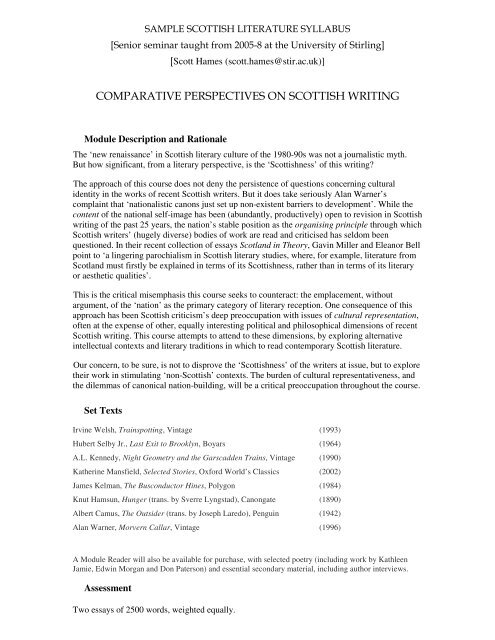
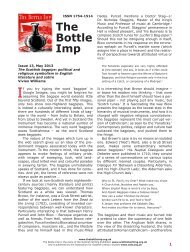
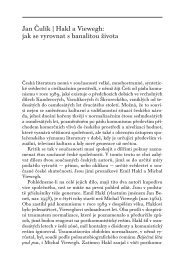

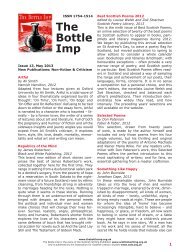
![IPA Index 1 People - E © M K C MacMahon 2007 E, [ ]: 1900.févr ...](https://img.yumpu.com/46502562/1/190x245/ipa-index-1-people-e-ac-m-k-c-macmahon-2007-e-1900facvr-.jpg?quality=85)

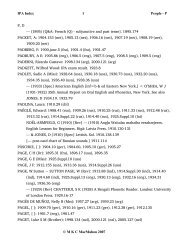
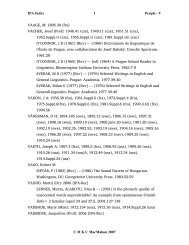
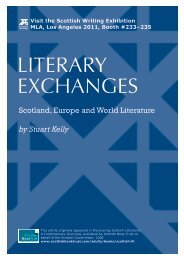
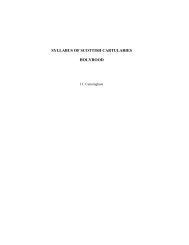
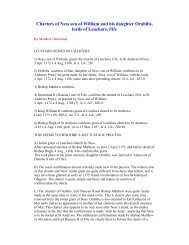

![IPA Index 1 People - D © M K C MacMahon 2007 D, [ ]: 1900.févr ...](https://img.yumpu.com/9908389/1/190x245/ipa-index-1-people-d-c-m-k-c-macmahon-2007-d-1900fevr-.jpg?quality=85)
